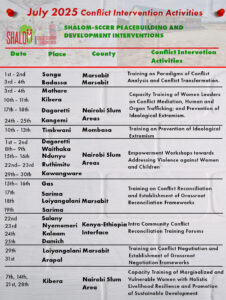By Godfrey Okoth Onyango
For years, peace between the Turkana and the Samburu communities has remained elusive. The efforts to bridge the gap between the two communities have often been jeopardized by the recurrent interethnic attacks and the undying mistrust as the two communities persistently turn against each other in well-coordinated attacks which have often left behind trails of death, injuries, wanton destruction of property and loss of hundreds to thousands of livestock. Shalom has been playing a pivotal role in bringing together the Turkana and Samburu communities living in various conflict affected areas in Samburu County to initiate sustainable interventions to the conflict between the Turkana and the Samburu.

A section of Turkana and Samburu women who have been mobilized by STL follow proceedings of the commissioning meeting held in Tuum on 7th April, 2016.
These initiatives have registered significant levels of success and for the past one year, the residents of Tuum and Parkati in Samburu North can boast of an uninterrupted peace which has enhanced interaction and even boosted economic development as schools, markets and other social amenities have remained in operation throughout the year.
The prevalence of relative peace has however awakened the need to broaden the base of stakeholders who have traditionally responded to conflict between the Turkana and Samburu. This has led the two communities to consider the great potential that women have in influencing positive change within communities such as these that continue grappling with the effects of interethnic conflict.
Having been trained on the various skills of conflict intervention by SCCRR for the past 3 years, the School of Training Community Leaders (STCL) from Tuum in collaboration with Amani Group from Parkati began an initiative of women empowerment with the aim of encouraging women to take a more active role in peace-building. The initiative which was started in December 2015 has brought together 260 women from both the Turkana and Samburu communities living in Tuum, Parkati, Simale, Waso Rongai and Lare-orok.

Rebecca Ekiru; a Turkana woman from Parkati (far left) seated with 4 Samburu women following the proceedings during the commissioning of the women for peace in Tuum.
In his explanation of why the SCCRR ToTs in Tuum and Parkati started the initiative, Daniel Lemoosa, a key initiator of the process had this to say, “Women are the ones who hide the guns for their sons whenever they are not using them and so they can refuse to release them if the son asks for it but fails to disclose what he is going to do with it. Moreover, mothers have traditional ways of sanctioning the actions of their sons and this makes them key people in deciding what their sons do or not do.” Though they had started the initiative months earlier, there was need to officially commence the work of the women in a public gathering where the community would also witness and appreciate the process.
The meeting whose aim was to bolster cohesion among Turkana and Samburu women as well as to commission them for peace brought together 10 Turkana women from Parkati (The only Turkana village in Nyiro division) and 40 Samburu women from the remaining 4 villages which are purely inhabited by the Samburu. The 6 hour event comprised of talks on peace and a deliberation on how Samburu and Turkana women can initiate peace in their respective communities. The women had an opportunity to share with each other their experiences of conflict as a way of motivating action within them.

Turkana and Samburu women in a rare show of unity light a ‘fire of peace’ symbolizing the beginning of a new commitment to peace.
This event could not end without a moment of interaction and celebration as the women communicated their resolve and commitment to take action for peace in traditional Samburu and Turkana songs and dances. In order to demonstrate their lifelong commitment to peace, the women standing in a circle while singing traditional songs of peace lit fire in the traditional way to symbolize the beginning of a new life and the continuation of their resolve to make conflict a gone history. The event closed with a traditional Samburu prayer after the women had shared a meal of roasted goat meat to symbolize their resolution to work together regardless of their ethnic identity.
The commissioning of the women for peace is a clear show of how Shalom’s work in influencing action for peace has gained momentum. The unity of purpose between the Samburu and Turkana women and the resolve by SCCRR participants from both the two communities to spearhead women participation in peace-building shows good prospects from a community that is slowly overcoming demeaning cultural practices and is out to explore all means possible in order to achieve sustainable positive peace.
With the guaranteed support from the community and the already demonstrated goodwill from the women, SCCRR is on the right path towards achieving even greater success in its endeavors to build greater cohesion between the Samburu and Turkana communities living in Nyiro division.

